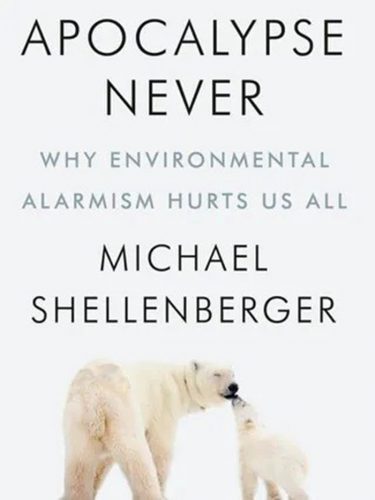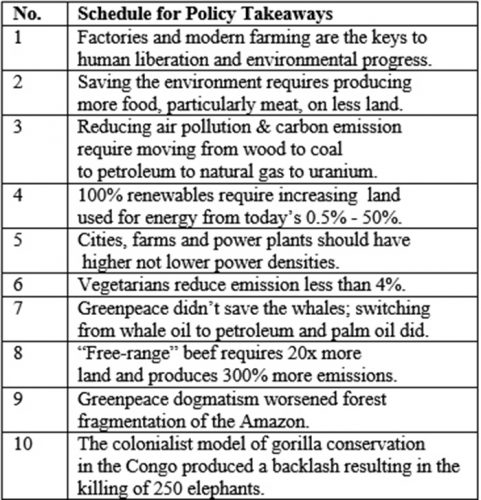In Apocalypse Never, Michael Shellenberger displays great personal courage in admitting to his intellectual dishonesty up till then. He does not seek to claim ignorance was responsible for his earlier writings. Instead he bluntly admitted to his personal weaknesses and flaws. Today’s column begins by pursuing this further, before evaluating his newly arrived-at policy stances. Shellenberger is aware that his critics may seek to strategize their responses to his views as a case of simple climate denialism. But, he argues this would be a result of the intellectual inertia that has been created by the very climate alarmism he had helped to foster.
Indeed, he has further confessed that: “until last year (2019) I mostly avoided speaking out against the climate scare. Partly that’s because I was embarrassed. After all, I am as guilty of alarmism as any other environmentalist. For years, I referred to climate change as an existential threat to human civilization, and called it a crisis. But mostly I was scared …of losing friends and funding.”
In this period of dis-information, silence, and cover up, hyperbolic claims ruled in public debates. And, he further observes that these formed the corpus of a growing crescendo of what I have termed as noise and nonsense. In furtherance of this he cites several examples. To cite a couple, there is the claim of US Democratic party left wing leader Alexandria Ocasio-Cortez that, “the world is going to end in twelve years if we do not address climate change;” and the 2019 global survey which reports the result that half of those surveyed believe climate change will make humanity extinct!
Policy Takeaways
Like the factual takeaways cited in last week’s column, the policy takeaways represented in Schedule 1 below reveals in tabular form the ten policy takeaways listed in Shellenberger’s discussion of his text in the June 29, 2020 Environmental Progress Newsletter. Before addressing these, it is apposite to observe that Shellenberger focuses on the motivations of those who promote dis-information and fake news. I believe this is important as these questions have been raised in reference to the noise and nonsense purveyors in regard to Guyana’s infant oil and gas sector.
As Shellenberger notes, the final three Chapters of Apocalypse Never aim at exposing the “financial, political, and ideological motivations of groups,” especially environmental ones. He notes that “groups have accepted hundreds of millions of dollars from fossil fuel interests” The local equivalent would include locally vocal external groups financed by “biased interests”, big oil ex-employees, service providers and wannabe employees in the sector advertising their wares. He also identifies “groups motivated by anti-humanist beliefs” Thus we find there are those, as in Guyana, who argue for shutting down the oil industry or drastically reducing its present footprint in the name of environmental correctness and rectitude. Comfortable in their own economic wellbeing, scant regard is paid by environmentalists to the needs of the masses of Guyanese suffering from poverty and inequality
Shellenberger mockingly notes that so anti-humanist are these positions that the agitation of these groups has successfully “forced the World Bank to stop trying to end poverty and instead make poverty sustainable!” As earlier pointed out, a principal Shellenberger thesis is that poverty is the greatest environmental threat posed by human habitation on Planet Earth. He has also cynically observed that misinformation has been rampant and most worryingly led “often by people with plainly unsavory or unhealthy motivations”.
Table 1 below highlights ten main policy takeaways as indicated by Shellenberger himself in his news reporting on his book, carried in Environmental Progress on June 29 2020. These takeaways range from critical observations on popular pro-environment policies that are misguided [items 9 and 10, dealing with Greenpeace dogmatism induced fragmentation in the Amazon and colonialist led wildlife conservation and the backlash it produced] to policies in support of his thrust on economic growth and technological advancement and breakthroughs [see items 1-4].
Conclusion
Shellenberger makes the heroic jump to see in environmental alarmism the remnants of Malthusian ideology despite the situation where this ideology has been repeatedly debunked for centuries. Simply put this ideology is founded on a straightforward exponential growth model, which asserts that population can potentially grow exponentially but that the carrying capacity of Planet Earth [food health, and other means of livelihoods] can only grow linearly. There is therefore a continual existential threat of overpopulation, hunger and destitution hanging like the sword of Damocles over human society everywhere.
Next week I’ll present an overall summary of the main lessons that I have gathered from the three outstanding publications that I have reviewed over the past six weeks.








